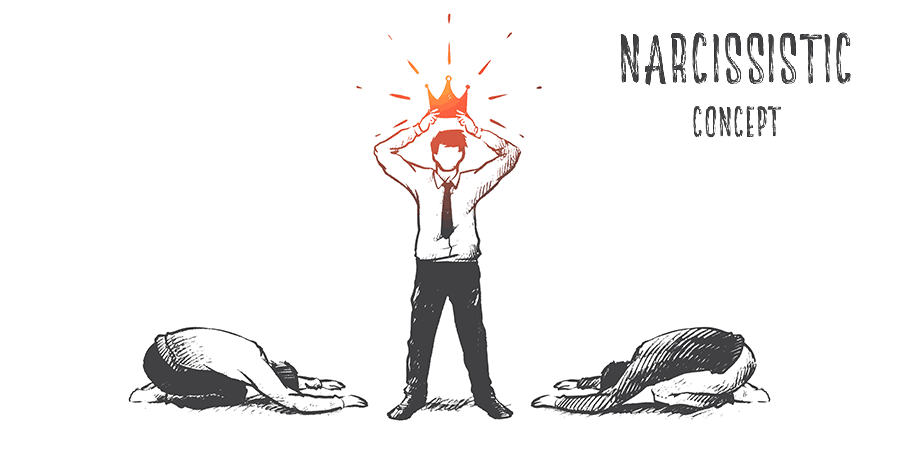A narcissist is a standard description for people who seem self-absorbed and vain – those who are only concern about themselves and have a never-ending need for compliments. The reality is that Narcissistic Personality Disorder (NPD) is a serious mental health disorder that affects a large number of people.
The two primary traits of people with a narcissistic personality disorder are that they often have an inflated sense of self-importance and a need for excessive attention and admiration from others. They usually also suffer from a lack of empathy for others, making meaningful and stable relationships a challenge. Although most people with NPD might seem self-secure and even arrogant at times, the reality is most have extremely fragile self-esteem that is vulnerable to the slightest doubt or criticism.
Typical Narcissistic Behavior
Narcissistic personality disorder often causes problems in many areas of someone’s life, especially with relationships, at work, or when dealing with financial affairs. Individuals suffering from this disorder, generally feel unhappy or disappointed with others, because they do not get the specific attention, favors, or admiration they believe they deserve.
Frequently, family and friends feel like they walk on eggshells when around this person. Loved ones may also feel ignored and unheard when a real emotional response is appropriate, as narcissists primarily feel for themselves.
These are some characteristics or “symptoms” of narcissistic personality disorder that may seem familiar to you or remind you of someone you know:
- Have an exaggerated sense of self-importance
- Expect and require constant and excessive admiration. Have a sense of entitlement.
- Always exaggerating talents or achievements.
- Want special favors and unquestioning compliance with your expectations.
- Expect to be seen as superior, even without achievements to warrant such expectations.
- The constant preoccupation of maintaining fantasies about success, power, brilliance, looks, or the perfect partner.
- Willing to take advantage of others in order to achieve goals.
- Inability or unwillingness to understand and consider others’ needs and feelings (i.e., lack of empathy)
- Behave arrogantly or haughtily, coming across as conceited, boastful and pretentious.
- Feel envious of others while believing others envy them.
- Insist on having the best of everything.
People with a narcissistic personality disorder also have trouble handling any comments which they often perceive as criticism, leading them to :
- Become frustrated and angry.
- Have significant relationship issues and often feeling slighted.
- Belittle others achievements or personalities, to make themselves appear superior.
- Have extreme difficulty, controlling emotions, and behavior.
- Feel depressed and moody as they fall short on expectations.
- Dealing with secret feelings of shame, insecurity, vulnerability, and humiliation.
Being in a Relationship With a Narcissist
A relationship with a narcissist is often challenging and can lead to quite a bit of emotional distress. Narcissistic individuals may only appear to care about others when having their own needs fulfilled or when serving a specific purpose. Yet, many are still attracted to people with a narcissistic personality.
It is estimated that around 1% of the US population suffers from NPD, which makes it very likely that we are all dealing or have dealt with a narcissistic person at some point in our lives. Studies also show that nearly 75% of individuals diagnosed with NPD are men. Although there is a significant and growing portion of the population, showing traits of narcissism, most people do not meet the criteria for personality disorder.
Some tests can help identify narcissists quite accurately. However, while many narcissists will admit to certain tendencies, they will resist a concrete psychiatric diagnosis.
Many are drawn to relationships with narcissist partners because this type of personality can be very captivating, especially in the beginning.
Those with NPD tend to have a big personality. They also tend to make you feel great for them to have chosen you. However, these great and captivating feelings, in time, can turn into harmful ones.
Narcissistic Victim Syndrome
Victimization is a standard tool of defense used by those suffering from this disorder. They are often prowling for any gullible person who will believe their version of victimhood, whether it is real, exaggerated, or fictitious. Their lives become one hurtful story after another. This is how they gain the attention, belief, and control of others. Victimized narcissists are masters of projection.
Those in relationship with them, need to be aware of this type of behavior because they often look charming to others, but commonly cause significant pain for those closest to them.
Dealing with Emotional Abuse
Emotional abuse is usually very hard for the person receiving it to recognize and end it. The one causing the abuse can often persuade the one receiving it into thinking they caused or deserved it, or that the abuse never took place. It may take a long time or a traumatic event to figure out this type of emotional abuse, especially when the perpetrator is so charming, smart, and manipulative. While there is a wide range of narcissistic types and behaviors, anywhere from level 1 to 1000, it does not take much for these type of personality to cause significant harm to those in their inner circle.
Tips on Dealing With a Narcissist
To save yourself from major pain, it is essential to recognize who you are dealing with and your responsibility in the relationship. Here are some tips:
- See the person in front of you for who they really are and not who you wish they were or will be.
- Break the spell. Keeping them in the spotlight is not helping either of you; it is actually feeding into the disorder.
- Speak up. Be specific and consistent about what’s acceptable and how their constant issues affect your life.
- Set boundaries. A person with a narcissistic personality tends to cross a lot of boundaries. They might feel entitled to snoop through your things, tell you how you should feel, and give you unsolicited advice. They might also try taking credit for things you have done. Setting clear boundaries is critical for a healthy relationship.
When you set boundaries, you should expect them to try manipulating you in feeling guilty, believing you are unreasonable and making a play for sympathy. They might involve other people to create a stronger case if they feel they are losing control over your feelings. Stand your ground, or they will not respect you now nor in the future. - Be careful with overinflated promises. Once they keep your attention, the goal is achieved. Most of the time, you cannot count on their words matching their actions.
Understand that narcissistic personality disorder is a mental health condition that often needs professional help not just for the person with the disorder, but those around them.



















